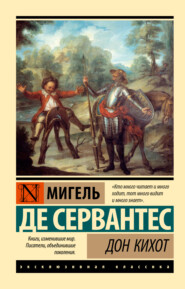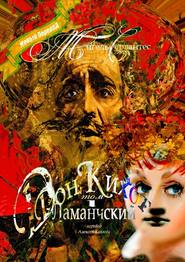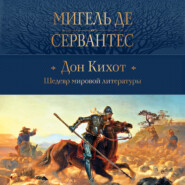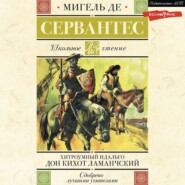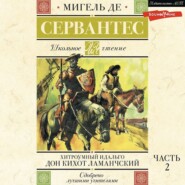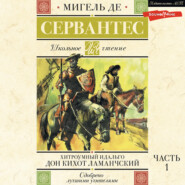По всем вопросам обращайтесь на: info@litportal.ru
(©) 2003-2025.
✖
The History of Don Quixote, Volume 2, Part 33
Настройки чтения
Размер шрифта
Высота строк
Поля
"It is true," said the damsel, "and I am that daughter; whether report lies or not as to my beauty, you, sirs, will have decided by this time, as you have seen me;" and with this she began to weep bitterly.
On seeing this the secretary leant over to the head-carver's ear, and said to him in a low voice, "Something serious has no doubt happened this poor maiden, that she goes wandering from home in such a dress and at such an hour, and one of her rank too." "There can be no doubt about it," returned the carver, "and moreover her tears confirm your suspicion." Sancho gave her the best comfort he could, and entreated her to tell them without any fear what had happened her, as they would all earnestly and by every means in their power endeavour to relieve her.
"The fact is, sirs," said she, "that my father has kept me shut up these ten years, for so long is it since the earth received my mother. Mass is said at home in a sumptuous chapel, and all this time I have seen but the sun in the heaven by day, and the moon and the stars by night; nor do I know what streets are like, or plazas, or churches, or even men, except my father and a brother I have, and Pedro Perez the wool-farmer; whom, because he came frequently to our house, I took it into my head to call my father, to avoid naming my own. This seclusion and the restrictions laid upon my going out, were it only to church, have been keeping me unhappy for many a day and month past; I longed to see the world, or at least the town where I was born, and it did not seem to me that this wish was inconsistent with the respect maidens of good quality should have for themselves. When I heard them talking of bull-fights taking place, and of javelin games, and of acting plays, I asked my brother, who is a year younger than myself, to tell me what sort of things these were, and many more that I had never seen; he explained them to me as well as he could, but the only effect was to kindle in me a still stronger desire to see them. At last, to cut short the story of my ruin, I begged and entreated my brother – O that I had never made such an entreaty-" And once more she gave way to a burst of weeping.
"Proceed, senora," said the majordomo, "and finish your story of what has happened to you, for your words and tears are keeping us all in suspense."
"I have but little more to say, though many a tear to shed," said the damsel; "for ill-placed desires can only be paid for in some such way."
The maiden's beauty had made a deep impression on the head-carver's heart, and he again raised his lantern for another look at her, and thought they were not tears she was shedding, but seed-pearl or dew of the meadow, nay, he exalted them still higher, and made Oriental pearls of them, and fervently hoped her misfortune might not be so great a one as her tears and sobs seemed to indicate. The governor was losing patience at the length of time the girl was taking to tell her story, and told her not to keep them waiting any longer; for it was late, and there still remained a good deal of the town to be gone over.
She, with broken sobs and half-suppressed sighs, went on to say, "My misfortune, my misadventure, is simply this, that I entreated my brother to dress me up as a man in a suit of his clothes, and take me some night, when our father was asleep, to see the whole town; he, overcome by my entreaties, consented, and dressing me in this suit and himself in clothes of mine that fitted him as if made for him (for he has not a hair on his chin, and might pass for a very beautiful young girl), to-night, about an hour ago, more or less, we left the house, and guided by our youthful and foolish impulse we made the circuit of the whole town, and then, as we were about to return home, we saw a great troop of people coming, and my brother said to me, 'Sister, this must be the round, stir your feet and put wings to them, and follow me as fast as you can, lest they recognise us, for that would be a bad business for us;' and so saying he turned about and began, I cannot say to run but to fly; in less than six paces I fell from fright, and then the officer of justice came up and carried me before your worships, where I find myself put to shame before all these people as whimsical and vicious."
"So then, senora," said Sancho, "no other mishap has befallen you, nor was it jealousy that made you leave home, as you said at the beginning of your story?"
"Nothing has happened me," said she, "nor was it jealousy that brought me out, but merely a longing to see the world, which did not go beyond seeing the streets of this town."
The appearance of the tipstaffs with her brother in custody, whom one of them had overtaken as he ran away from his sister, now fully confirmed the truth of what the damsel said. He had nothing on but a rich petticoat and a short blue damask cloak with fine gold lace, and his head was uncovered and adorned only with its own hair, which looked like rings of gold, so bright and curly was it. The governor, the majordomo, and the carver went aside with him, and, unheard by his sister, asked him how he came to be in that dress, and he with no less shame and embarrassment told exactly the same story as his sister, to the great delight of the enamoured carver; the governor, however, said to them, "In truth, young lady and gentleman, this has been a very childish affair, and to explain your folly and rashness there was no necessity for all this delay and all these tears and sighs; for if you had said we are so-and-so, and we escaped from our father's house in this way in order to ramble about, out of mere curiosity and with no other object, there would have been an end of the matter, and none of these little sobs and tears and all the rest of it."
"That is true," said the damsel, "but you see the confusion I was in was so great it did not let me behave as I ought."
"No harm has been done," said Sancho; "come, we will leave you at your father's house; perhaps they will not have missed you; and another time don't be so childish or eager to see the world; for a respectable damsel should have a broken leg and keep at home; and the woman and the hen by gadding about are soon lost; and she who is eager to see is also eager to be seen; I say no more."
The youth thanked the governor for his kind offer to take them home, and they directed their steps towards the house, which was not far off. On reaching it the youth threw a pebble up at a grating, and immediately a woman-servant who was waiting for them came down and opened the door to them, and they went in, leaving the party marvelling as much at their grace and beauty as at the fancy they had for seeing the world by night and without quitting the village; which, however, they set down to their youth.
The head-carver was left with a heart pierced through and through, and he made up his mind on the spot to demand the damsel in marriage of her father on the morrow, making sure she would not be refused him as he was a servant of the duke's; and even to Sancho ideas and schemes of marrying the youth to his daughter Sanchica suggested themselves, and he resolved to open the negotiation at the proper season, persuading himself that no husband could be refused to a governor's daughter. And so the night's round came to an end, and a couple of days later the government, whereby all his plans were overthrown and swept away, as will be seen farther on.
CHAPTER L.
WHEREIN IS SET FORTH WHO THE ENCHANTERS AND EXECUTIONERS WERE WHO FLOGGED THE DUENNA AND PINCHED DON QUIXOTE, AND ALSO WHAT BEFELL THE PAGE WHO CARRIED THE LETTER TO TERESA PANZA, SANCHO PANZA'S WIFE
Cide Hamete, the painstaking investigator of the minute points of this veracious history, says that when Dona Rodriguez left her own room to go to Don Quixote's, another duenna who slept with her observed her, and as all duennas are fond of prying, listening, and sniffing, she followed her so silently that the good Rodriguez never perceived it; and as soon as the duenna saw her enter Don Quixote's room, not to fail in a duenna's invariable practice of tattling, she hurried off that instant to report to the duchess how Dona Rodriguez was closeted with Don Quixote. The duchess told the duke, and asked him to let her and Altisidora go and see what the said duenna wanted with Don Quixote. The duke gave them leave, and the pair cautiously and quietly crept to the door of the room and posted themselves so close to it that they could hear all that was said inside. But when the duchess heard how the Rodriguez had made public the Aranjuez of her issues she could not restrain herself, nor Altisidora either; and so, filled with rage and thirsting for vengeance, they burst into the room and tormented Don Quixote and flogged the duenna in the manner already described; for indignities offered to their charms and self-esteem mightily provoke the anger of women and make them eager for revenge. The duchess told the duke what had happened, and he was much amused by it; and she, in pursuance of her design of making merry and diverting herself with Don Quixote, despatched the page who had played the part of Dulcinea in the negotiations for her disenchantment (which Sancho Panza in the cares of government had forgotten all about) to Teresa Panza his wife with her husband's letter and another from herself, and also a great string of fine coral beads as a present.
Now the history says this page was very sharp and quick-witted; and eager to serve his lord and lady he set off very willingly for Sancho's village. Before he entered it he observed a number of women washing in a brook, and asked them if they could tell him whether there lived there a woman of the name of Teresa Panza, wife of one Sancho Panza, squire to a knight called Don Quixote of La Mancha. At the question a young girl who was washing stood up and said, "Teresa Panza is my mother, and that Sancho is my father, and that knight is our master."
"Well then, miss," said the page, "come and show me where your mother is, for I bring her a letter and a present from your father."
"That I will with all my heart, senor," said the girl, who seemed to be about fourteen, more or less; and leaving the clothes she was washing to one of her companions, and without putting anything on her head or feet, for she was bare-legged and had her hair hanging about her, away she skipped in front of the page's horse, saying, "Come, your worship, our house is at the entrance of the town, and my mother is there, sorrowful enough at not having had any news of my father this ever so long."
"Well," said the page, "I am bringing her such good news that she will have reason to thank God."
And then, skipping, running, and capering, the girl reached the town, but before going into the house she called out at the door, "Come out, mother Teresa, come out, come out; here's a gentleman with letters and other things from my good father." At these words her mother Teresa Panza came out spinning a bundle of flax, in a grey petticoat (so short was it one would have fancied "they to her shame had cut it short"), a grey bodice of the same stuff, and a smock. She was not very old, though plainly past forty, strong, healthy, vigorous, and sun-dried; and seeing her daughter and the page on horseback, she exclaimed, "What's this, child? What gentleman is this?"
"A servant of my lady, Dona Teresa Panza," replied the page; and suiting the action to the word he flung himself off his horse, and with great humility advanced to kneel before the lady Teresa, saying, "Let me kiss your hand, Senora Dona Teresa, as the lawful and only wife of Senor Don Sancho Panza, rightful governor of the island of Barataria."
"Ah, senor, get up, do that," said Teresa; "for I'm not a bit of a court lady, but only a poor country woman, the daughter of a clodcrusher, and the wife of a squire-errant and not of any governor at all."
"You are," said the page, "the most worthy wife of a most arch-worthy governor; and as a proof of what I say accept this letter and this present;" and at the same time he took out of his pocket a string of coral beads with gold clasps, and placed it on her neck, and said, "This letter is from his lordship the governor, and the other as well as these coral beads from my lady the duchess, who sends me to your worship."
Teresa stood lost in astonishment, and her daughter just as much, and the girl said, "May I die but our master Don Quixote's at the bottom of this; he must have given father the government or county he so often promised him."
"That is the truth," said the page; "for it is through Senor Don Quixote that Senor Sancho is now governor of the island of Barataria, as will be seen by this letter."
"Will your worship read it to me, noble sir?" said Teresa; "for though I can spin I can't read, not a scrap."
"Nor I either," said Sanchica; "but wait a bit, and I'll go and fetch some one who can read it, either the curate himself or the bachelor Samson Carrasco, and they'll come gladly to hear any news of my father."
"There is no need to fetch anybody," said the page; "for though I can't spin I can read, and I'll read it;" and so he read it through, but as it has been already given it is not inserted here; and then he took out the other one from the duchess, which ran as follows:
Friend Teresa, – Your husband Sancho's good qualities, of heart as well as of head, induced and compelled me to request my husband the duke to give him the government of one of his many islands. I am told he governs like a gerfalcon, of which I am very glad, and my lord the duke, of course, also; and I am very thankful to heaven that I have not made a mistake in choosing him for that same government; for I would have Senora Teresa know that a good governor is hard to find in this world and may God make me as good as Sancho's way of governing. Herewith I send you, my dear, a string of coral beads with gold clasps; I wish they were Oriental pearls; but "he who gives thee a bone does not wish to see thee dead;" a time will come when we shall become acquainted and meet one another, but God knows the future. Commend me to your daughter Sanchica, and tell her from me to hold herself in readiness, for I mean to make a high match for her when she least expects it. They tell me there are big acorns in your village; send me a couple of dozen or so, and I shall value them greatly as coming from your hand; and write to me at length to assure me of your health and well-being; and if there be anything you stand in need of, it is but to open your mouth, and that shall be the measure; and so God keep you.
From this place. Your loving friend, THE DUCHESS.
"Ah, what a good, plain, lowly lady!" said Teresa when she heard the letter; "that I may be buried with ladies of that sort, and not the gentlewomen we have in this town, that fancy because they are gentlewomen the wind must not touch them, and go to church with as much airs as if they were queens, no less, and seem to think they are disgraced if they look at a farmer's wife! And see here how this good lady, for all she's a duchess, calls me 'friend,' and treats me as if I was her equal – and equal may I see her with the tallest church-tower in La Mancha! And as for the acorns, senor, I'll send her ladyship a peck and such big ones that one might come to see them as a show and a wonder. And now, Sanchica, see that the gentleman is comfortable; put up his horse, and get some eggs out of the stable, and cut plenty of bacon, and let's give him his dinner like a prince; for the good news he has brought, and his own bonny face deserve it all; and meanwhile I'll run out and give the neighbours the news of our good luck, and father curate, and Master Nicholas the barber, who are and always have been such friends of thy father's."
"That I will, mother," said Sanchica; "but mind, you must give me half of that string; for I don't think my lady the duchess could have been so stupid as to send it all to you."
"It is all for thee, my child," said Teresa; "but let me wear it round my neck for a few days; for verily it seems to make my heart glad."
"You will be glad too," said the page, "when you see the bundle there is in this portmanteau, for it is a suit of the finest cloth, that the governor only wore one day out hunting and now sends, all for Senora Sanchica."
"May he live a thousand years," said Sanchica, "and the bearer as many, nay two thousand, if needful."
With this Teresa hurried out of the house with the letters, and with the string of beads round her neck, and went along thrumming the letters as if they were a tambourine, and by chance coming across the curate and Samson Carrasco she began capering and saying, "None of us poor now, faith! We've got a little government! Ay, let the finest fine lady tackle me, and I'll give her a setting down!"
"What's all this, Teresa Panza," said they; "what madness is this, and what papers are those?"
"The madness is only this," said she, "that these are the letters of duchesses and governors, and these I have on my neck are fine coral beads, with ave-marias and paternosters of beaten gold, and I am a governess."
"God help us," said the curate, "we don't understand you, Teresa, or know what you are talking about."
"There, you may see it yourselves," said Teresa, and she handed them the letters.
The curate read them out for Samson Carrasco to hear, and Samson and he regarded one another with looks of astonishment at what they had read, and the bachelor asked who had brought the letters. Teresa in reply bade them come with her to her house and they would see the messenger, a most elegant youth, who had brought another present which was worth as much more. The curate took the coral beads from her neck and examined them again and again, and having satisfied himself as to their fineness he fell to wondering afresh, and said, "By the gown I wear I don't know what to say or think of these letters and presents; on the one hand I can see and feel the fineness of these coral beads, and on the other I read how a duchess sends to beg for a couple of dozen of acorns."
"Square that if you can," said Carrasco; "well, let's go and see the messenger, and from him we'll learn something about this mystery that has turned up."
They did so, and Teresa returned with them. They found the page sifting a little barley for his horse, and Sanchica cutting a rasher of bacon to be paved with eggs for his dinner. His looks and his handsome apparel pleased them both greatly; and after they had saluted him courteously, and he them, Samson begged him to give them his news, as well of Don Quixote as of Sancho Panza, for, he said, though they had read the letters from Sancho and her ladyship the duchess, they were still puzzled and could not make out what was meant by Sancho's government, and above all of an island, when all or most of those in the Mediterranean belonged to his Majesty.
To this the page replied, "As to Senor Sancho Panza's being a governor there is no doubt whatever; but whether it is an island or not that he governs, with that I have nothing to do; suffice it that it is a town of more than a thousand inhabitants; with regard to the acorns I may tell you my lady the duchess is so unpretending and unassuming that, not to speak of sending to beg for acorns from a peasant woman, she has been known to send to ask for the loan of a comb from one of her neighbours; for I would have your worships know that the ladies of Aragon, though they are just as illustrious, are not so punctilious and haughty as the Castilian ladies; they treat people with greater familiarity."
In the middle of this conversation Sanchica came in with her skirt full of eggs, and said she to the page, "Tell me, senor, does my father wear trunk-hose since he has been governor?"
"I have not noticed," said the page; "but no doubt he wears them."
"Ah! my God!" said Sanchica, "what a sight it must be to see my father in tights! Isn't it odd that ever since I was born I have had a longing to see my father in trunk-hose?"
"As things go you will see that if you live," said the page; "by God he is in the way to take the road with a sunshade if the government only lasts him two months more."






